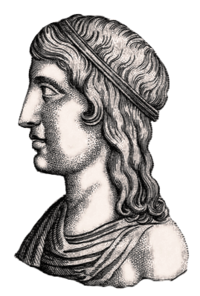The US FDA’s proposed rule on laboratory-developed tests: Impacts on clinical laboratory testing
Contents
Apuleius | |
|---|---|
 depiction of Apuleius | |
| Born | c. 125 Madaurus |
| Died | c. 170 |
| Occupation | Novelist, writer, public speaker |
| Notable works | The Golden Ass |
Apuleius was a philosopher and rhetorician tried for using magic to win an older and richer bride. He's better known for his novel about the cult of Isis, the tale of Cupid and Psyche, and the adventures of its hero, Lucius.
Apuleius was born in about 125, in Madauros, Numidia. It is not known what his first name was, although writers in the Middle Ages often called him "Lucius Apuleius" because the hero of his novel was called Lucius.[1][2] Apuleius was educated in Carthage and Athens, and then traveled around the Mediterranean learning about religious cults. In 158 he delivered a speech recorded as Apologia Apuleii 'The Apology of Apuleius' in the town of Sabratha, Tripolitania (modern Libya), as a defense against the charge of using magic to win a richer and older bride called Pudentilla. Apuleius, in his Apology, provides a glimpse into second century Roman law, the economic and social conditions of Roman North Africa, and the attitude towards magic.
Apuleius died in about 175 A.D., having written his novel, known as either The Golden Ass or The Metamorphoses (also Transformations of Lucius), and the Apology, as well as books on Plato, Socrates, and Aristotle.
References
Other websites
- Apuleius (123–180 CE) the Famous Berber writer Archived 2008-09-20 at the Wayback Machine
- Apulei Opera (Latin texts of all the surviving works of Apuleius) at The Latin Library
- English translation of Florida by H. E. Butler (PDF)
- English translation of the Apologia by H. E. Butler Archived 2011-07-20 at the Wayback Machine
- English translation of the God of Socrates by Thomas Taylor Archived 2010-10-03 at the Wayback Machine
- English translation of the Apologia by H. E. Butler (PDF)
- Apuleius – Apologia: Seminar Archived 2004-06-07 at the Wayback Machine (Latin text of the Apologia with H. E. Butler's English translation and an English crib with discussion and commentary)
- Apology as Prosecution: The Trial of Apuleius
- Apuleius' works: text, concordances and frequency list
- Works by Apuleius at Project Gutenberg

















